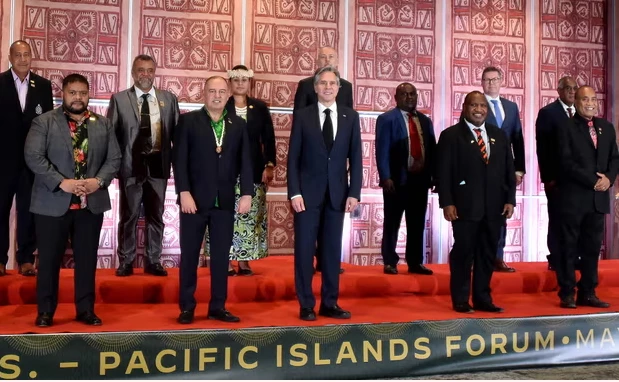Pacific leaders have hailed the signing of a new economic and security deal with the United States, after a five-month delay that had raised questions about Washington's influence in the region.
US President Joe Biden signed the Compact of Free Association agreements with the leaders of Pacific nations Palau, the Marshall Islands and the Federated States of Micronesia in Washington over the weekend.
Secretary of State Anthony Blinken said the United States was looking "forward to working" with its Pacific partners "over the next two decades".
The 20-year deal provides the three Pacific nations with a total of $7.1 billion in funding, Blinken added. It was approved by the US Senate as part of a spending package worth $460 billion.
The compact agreement gives the Pacific nations security and budget guarantees. In return, Washington gains influence and the right to locate military facilities across a swathe of the central Pacific.
Marshall Islands President Hilda Heine said the agreement "represents a very big step in our mutual and enduring efforts to strengthen and improve the Compact."
The deal includes $700 million for the Marshalls over the next four years as part of a trust fund agreement, she added.
Special funds to counter climate change and additional money for health care are included.
Micronesia President Wesley Simina described the signing as "an important milestone" which "opens a new chapter in our enduring partnership with the United States".
Simina said Micronesia will receive funding for education, health care, environmental projects and improved infrastructure.
The office of Palau President Surangel Whipps Jr said it was "wonderful news". The legislation includes $889 million for Palau, officials said in a statement.
The signing ends months of delays in Washington.
Palau and Micronesia agreed to renew the compact in the middle of last year. The Marshall Islands followed suit in October, but US lawmakers took five months to agree on a package.
With Washington and Beijing tussling for influence in the Pacific, Heine had said the delay was damaging to US relations with the Marshalls.
Members of Congress from both parties in February warned US House speaker Mike Johnson that a failure to ratify the compacts would be "the most self-destructive gift the United States could give to the PRC (China) in the Pacific".


